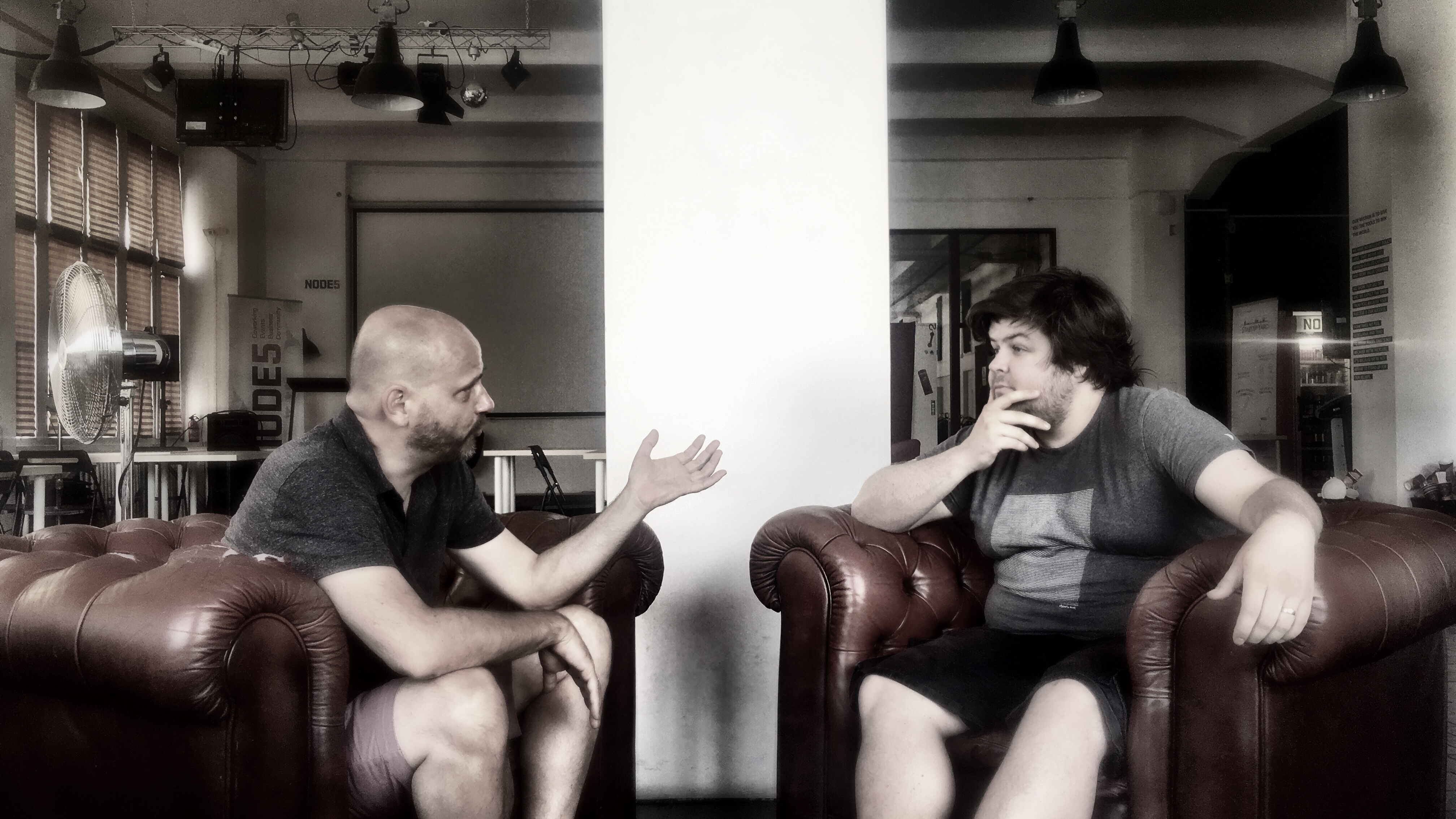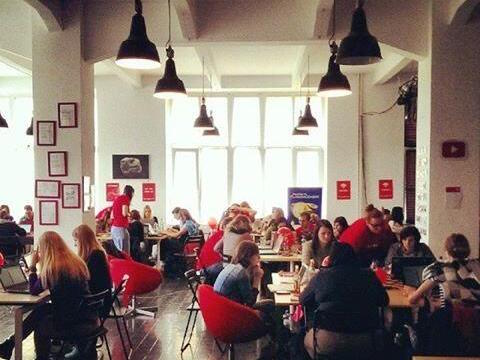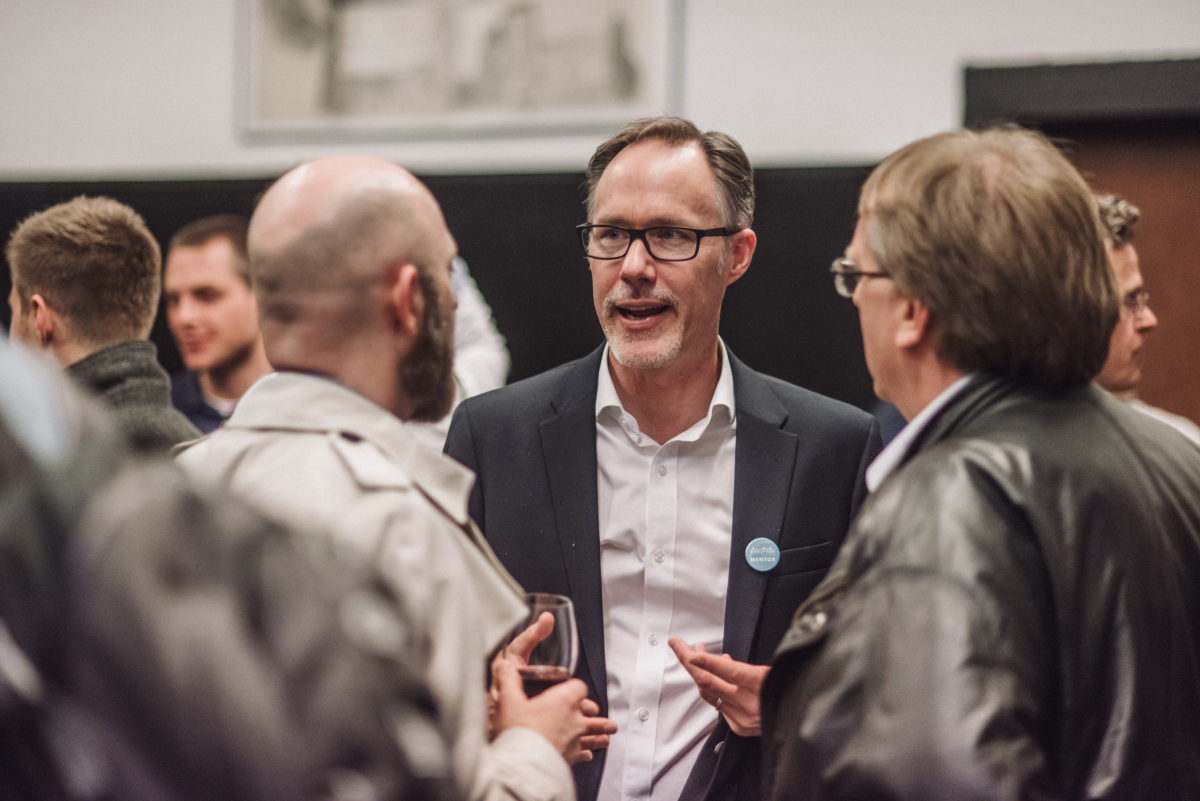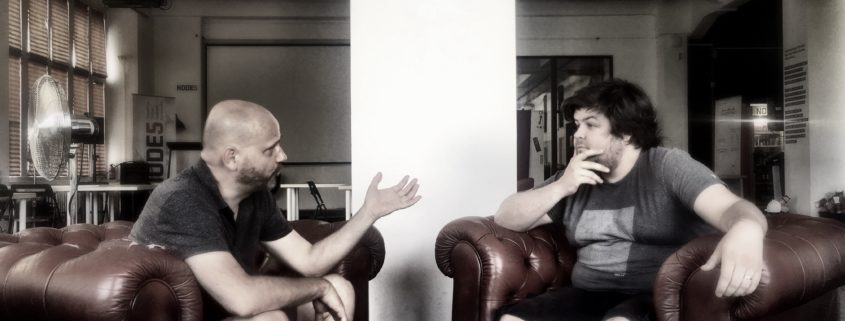6 Years and 59 Startups Later: Here’s Why StartupYard Works
This week our CEO Cedric Maloux and I sat down for a conversation about the struggles and the excitement of recruiting and working with amazing startups together for the past 4 years as MD, and his 6 years as a mentor.
StartupYard last year announced our largest fundraise so far, of about €1 million for up to 20 new startups in 2017-2018. How did we get here? What have we learned? Here are the most interesting exchanges that came out of our discussion:
Hi Cedric, every week during the StartupYard program management meetings, you ask founders one question: “What are you struggling with right now?” I think it’s fair to start with the same question here:
Sleep! [Laughs].
I have two sources of stress when it comes to every StartupYard round, and this is now going to be my 5th time going through it. The biggest stress is Demo Day. Like a parent or a teacher watching their kids take the next big step in life, our whole team works very hard to make sure our founders and startups look great, professional, in control, and ready. But when they go out on that stage, our hands are off the wheel, and they are on their own. That’s a big scary moment for me, and for the founders. I don’t want them to feel that they’ve failed themselves.
The other stress is right now. We are looking for startups, talking to startups, trying to get the right startup founders to apply for our next round at StartupYard. We will invest in up to 20 companies in the next 12 months. I am always slightly panicked at the idea that we’ll miss one, or that one won’t find us, and will miss an opportunity that can really help them to succeed in business, and hopefully in life. I get real joy from making a difference in people’s lives, so I have that fear that I won’t do all I can.

What specifically are you afraid will happen, or not happen?
We can make the wrong choices. We have in the past – though not often, thankfully. StartupYard takes a big risk in trusting people we barely know, to be strong and committed and honest and open enough to go through a really demanding experience. It is very humbling. And I know we aren’t always right about people. We invest in founders, but you don’t really know someone until you spend every day, all day, with that person. Sometimes we’re not sure, and they turn out to be just amazing. Other times we are sure, and it turns out we were off.
So I’m stressed right now about those decisions, and knowing that later is too late.
So what helps you sleep at night, knowing that you’ll never be able to perfectly predict who will apply, and how they’ll perform?
Luckily we surround ourselves with really great advisors and investors. We have a great selection committee, who really get what we’re trying to do. They serve as a check against our biases and assumptions. We have been very lucky, but we also work very hard to remain humble, knowing we will make some mistakes.
In some way, every investment decision we make at StartupYard is a bit crazy from a normal perspective. We invest our time and money into people we have met maybe twice or three times. It takes a lot of faith. Among investors, accelerators like StartupYard are the ones with the least actionable data, KPIs or traction to judge in a startup. We have to believe our hearts and our noses. We have to trust in our experience and instincts more than other investors, who can point to solid numbers to tell the story. We go on much less.
Hearts and noses?
Yes. If you’re investing in a later stage, it’s all about numbers and trends. We can see trends, but we have very little in terms of numbers. So we also have to really understand people to make the right choices. I say our hearts and our noses, because our hearts are for people, but our noses are for opportunity. If we believe in someone, and we believe that there is an opportunity in what they’re doing, then that is enough for us.

What makes you particularly fitted for a role like this?
I think a person can’t imagine what it takes to go from an idea to a profitable company unless they’ve done it, and experienced it themselves. I have done that multiple times in my life.
And unless you’ve experienced the opposite, which is failure, you probably think somewhere in the back of your mind that it can’t happen to you. I’ve also failed, publically. The last time one of my ventures was mentioned in Wired, it was in the context of the company going out of business.
So I know what that’s like to be notable enough to be in Wired, but still to fail. I have a deep technical background (I studied AI at University in the 1990s, when it wasn’t cool), and I’ve had a long career in sales. If a founder can’t sell; to employees, to co-founders, to investors, and customers, then he can’t make his ideas a reality.
So sales is not just about closing deals?
No. It’s about everything. Selling is essential. I’ve sold customer-facing services. I’ve sold B2B products to big corporations. I’ve sold my own company. Selling is an art. As we say, “telling isn’t selling.” You have to be able to not just talk about your ideas, but sell them.
Also, I learned a lot from running online businesses during the 2000 Internet bubble and the 2008 financial crisis. These things taught me the hard way about discipline in the fundamentals of business.

What was your hardest lesson through those experiences?
Cost understanding and control is at the heart of your company. You can only control one thing: your costs. Revenue projections, cost control: these are the things that get you through a crisis. It’s all about planning. Not your revenue, or development time, or investors, or customers. Just costs. Knowing when the money will run out. So financial hygiene is a top priority.
You’ve run companies. You’ve sold one company. So from that background, if you were starting a tech startup today, would you apply to an accelerator, even knowing everything you know?
Short answer, yes I would.
Long answer, I do have a few tech businesses on the side that I have started with other people, and with one, I’ve been encouraging the CEO to apply to an accelerator (though not StartupYard because it’s not in our area of focus). That should tell you what I think about accelerators, and not just about StartupYard.
If I was starting a business, I would go to one tomorrow, because no matter how much experience I have, I am limited by my own capacity as a human being. One thing that I’ve learned over the years, is that success doesn’t come from what you know, but from who you know. Your network is a vital ingredient for success.
A great startup has these things: a hard problem to solve, a great solution, a clear value-proposition, a strong sales/marketing team, perfect timing, and great connections. You cannot be in control of every one of those things at any one time. You can however always work on your network. An accelerator connects you with people who help you seize opportunities and move fast when the time is right. Your connections help you discover weaknesses, and also opportunities. Knowing you need help is a strength, not a weakness.
Speaking of networks, StartupYard has quite a few corporations on its mentor list. Why do you focus so much on corporates during mentorship?
It’s a good question, and one we are asked a lot. Startups even tell us they would like to meet more people who are more like them. Usually when you meet a mentor, like at a competition or in a conference or at an incubator, or many other accelerators, they tend to be investors, or entrepreneurs.
It’s actually relatively easy to get a meeting with an investor or an entreprepreneur, which is why it’s easy to convince them to mentor startups. But, if you’re a B2B startup looking for early traction, you need to go door to door, talking to customers. And most of the time doing that, you’ll meet low level people.
What we decided early on, was to incorporate high-level corporate decision-makers, not just a lot of people, but leaders and C-level executives. The people who aren’t so much in the internal politics of their corporations, but are in a position to make things happen for startups. And we have many concrete examples of that working really well.
If the Chairman of the Board at a bank invites one of our startups to talk to his executives, that’s a meeting where people will be paying attention. It will have results. Not long ago, our mentors at Microsoft brought one of our startups to meet Satya Nadella, CEO at Microsoft, in Redmond. You won’t be able to name many early-stage companies who can get that meeting.

Yes, I was genuinely surprised when that happened too. The engagement from Microsoft was extraordinary. What do you think the corporate people get out of being startup mentors?
As it happens, those heads of industry share many of the qualities of startup founders. Ambition, drive, vision. So they love to be exposed to young founders and interact with them, not just about ideas, but about ways of working and thinking. The CEO of a global corporation told me a while ago that it’s his job to know what’s going on outside his company, because they are under constant attack from startups. You have to know your adversary.
We sometimes call corporations “dumb and slow,” but it would be a mistake to think that the people running them are either dumb or slow. Often the people at the top are thinking very far ahead, and when a startup is looking for the right stakeholder, the top is often the best place to start. Outside of our program, our founders would just never get meetings with such people. Even if they did, it would take years to get them all, and by then it wouldn’t matter.
I feel very proud of our mentor group. One mentor told me recently, that it was an honor to be included. That just made me feel very proud. We have spent years developing StartupYard as a platform, but we can’t rest on our achievements. We have to keep improving and building that network ever round, or it dies.
You said you can’t rest. What is your biggest difficulty when it comes to talking to founders about acceleration?
I would say we see two types. There is the founder who really understands the value accelerators can bring, and is eager to join. The other is the one who is more defensive; defensive of their ideas, of their priorities, of their sense of control and sometimes pride as well.
They may see joining an accelerator as a risk rather than an opportunity: that they risk wasting time. But often I think it’s just that they risk giving up control. Startup founders can be control freaks, as everyone knows, and we ask people to give up some of that control in order to grow, and that is a hard thing to ask of people who have always performed at a high level in their lives. Even the tiny amount of control we want them to give up can seem like a big, big change.
But if you’re so concerned about making the wrong choices, that you don’t act, then you risk never making decisions at all. Our biggest challenge is to show skeptics that the accelerator is called an “accelerator” for a reason, and it is not to slow them down or take up their time. That interrupting their process and refocusing them can actually save them time, and not waste it.
All our alumni will confirm this to you and in fact, they often talk about the empty period after the program. Once a founder told me he wished the program never stopped. And this was a startup which already had some revenue, but had skyrocketed with us.
You have to be a bit smart and a bit arrogant to start a business, but you need to let your intelligence prevail, and admit when you need other people. We all start as fools in life, and the only people who are doomed to remain fools are the ones who refuse to admit this, and don’t let themselves be questioned.
Some founders will tell us that all they need is cash.
That’s true. But when you ask them: “If all you need is cash, then why don’t you already have it?” They start telling you about their real problems – the reasons investors aren’t giving them money. It’s usually because they haven’t earned it yet. They don’t have enough data, they don’t have enough traction, or they don’t know how to sell to the investors.
You are absolutely right, and in an environment where cash is king, it’s sometimes difficult to explain to these people that to deserve cash you need to go through some steps.
What we find is that the act of just applying to StartupYard, and answering very specific questions about their business can help founders to realize what they don’t know. Even just forcing yourself to really answer these questions, you can begin to see that there are a lot of areas where you can grow and learn more.
So you need to bring people down a bit to build them up?
Yes. The acceleration process is challenging not just intellectually, but also emotionally for some people. But if you want to really run a global business, and meet your potential as an entrepreneur, that is the kind of challenge you will have to face, one way or the other.
We aren’t here to judge people and their ideas. The projects we look at are very early stage, and the people running them have a lot of room for mistakes and wrong roads. Our job as an accelerator and the job of our mentors is to support people who are taking these creative risks, exposing them to dangers and opportunities. We prepare them for taking good risks, and being aware of the dangers they will face.
Over the past 5 years, I have repeated certain things over and over again through every program. One of them is: “be careful, about what might happen if…”
To you, what is the biggest misconception about what StartupYard does for founders?
What I think some founders don’t expect is that the mentorship process, and the whole acceleration program, is aimed not just at their business, but at them as people. It would be waste of their time, and ours, if we spent our energy trying to make people into something they don’t want to be. So we pay very careful attention to discovering, with our founders, what it is in their hearts that they really are passionate about and want to do and to become.
So it’s not just about business for you?
There is a saying: “just business, not personal.” But I think this is very misleading. Growing a global business is all about who you are as a person. If you do something that is true to who you are, and who you want to be, that is infinitely better, for everyone involved, than if you’re just trying to make money. You can make money in a lot of ways, if that’s what you want. We want to help people to become their best selves as founders, and that means finding in them that special energy they possess that no one else does, and helping them to tap into it.
The biggest successes in business don’t think “It’s just business.” They know it’s about more than themselves or this one goal. It’s about relationships and it’s about being true to who you are.
Any last words?
Apply to StartupYard! Applications close June 30th, so I hope anyone who recognizes themselves in what we’ve talked about will consider applying now.
I can’t wait to be impressed.
You can now apply for StartupYard Batch #9.
- Artificial Intelligence
- VR/AR
- IoT
- Cryptography
- Blockchain




